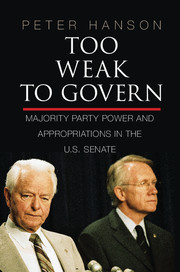2 - Testing Expectations
Published online by Cambridge University Press: 05 November 2014
Summary
How does the majority party’s strength or weakness affect its management of the annual appropriations process? What are the consequences of the choices that it makes as it decides how to adopt a dozen major bills? This chapter evaluates three types of quantitative evidence to test the theory of limited influence. First, I use common statistical tools to analyze the legislative history of appropriations bills from 1975 to 2012 and assess the relationship between party power and abandoning the regular order. Second, I investigate patterns in voting on amendments to examine the effect of abandoning the regular order on the opportunity for members to participate in lawmaking. Third, I examine voting patterns on omnibus spending bills to determine whether the bills draw bipartisan support or spark partisan divisions. The findings provide a strong initial validation of the limited influence theory. The data show that the Senate majority party abandons the regular order when it is small, divided, and distant from the minority, and that failing to bring individual bills to a vote correlates with a reduction in amending in the Senate. Omnibus spending bills also tend to attract large bipartisan coalitions.
The findings are encouraging because they are consistent with expectations, but a word of caution is in order. Quantitative data about the appropriations process have some inherent limits. The strength of these data is that they can be analyzed to identify basic patterns and the relationships between variables. Their limit is that they cannot address the questions of causality that are central to the limited influence theory. The findings of this chapter show that the majority party is more likely to abandon the regular order when it is small, divided, and distant from the minority. They cannot explain why. My solution to this problem is to rely on the accumulated weight of quantitative and qualitative evidence to test the theory. I review the historical record of debates on the Senate floor carefully in chapters to come. The answer to the question of “why” in most cases is easily visible in the record: filibuster fights, votes on difficult amendments, feuding within a party. The quantitative and qualitative data together offer compelling support for the limited influence theory.
- Type
- Chapter
- Information
- Too Weak to GovernMajority Party Power and Appropriations in the U.S. Senate, pp. 38 - 69Publisher: Cambridge University PressPrint publication year: 2014



